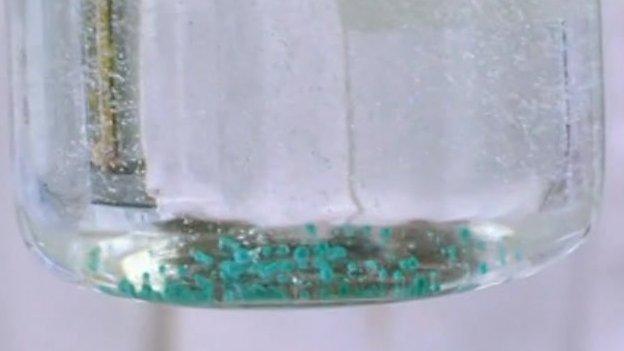'Microplastics in cosmetics damaging Welsh marine life'
- Published
Scientists say beauty products containing plastic microbeads are polluting water supplies in Wales
Cosmetic face scrubs may smooth people's skin but research shows they are also damaging Welsh marine life.
Scientists say beauty products containing plastic microbeads pollute water supplies, harm sea creatures and leave tiny particles in human food.
The beads are added to hundreds of skin care products to help remove dead skin cells.
Concerns have now been raised that microplastics are entering human food via cosmetic pollution in Welsh waters.
Marine biologist Dr Andrew Davies, from Bangor University, said researchers have noticed the tiny spheres accumulating inside the guts and gills of plankton.
He said they can cause "major problems" and scientists have been trying to understand the "ecosystem effect" of microplastics as they pass through the food chain.
Once washed down the sink, the beads pass through sewers before flowing into water systems.
Campaign group, Beat the Microbead, external, says sea creatures can "absorb or eat" microbeads, which they are unable to distinguish from organic food.
Microbeads, which are 5mm wide or less, are usually made of plastics such as polypropylene, polyethylene terephthalate or nylon.
Scientists say they can also act like tiny sponges, absorbing dangerous chemicals such as pesticides and flame retardants, before they are swallowed by fish.
Microplastics are non-biodegradable and are difficult to remove once they have entered a marine environment.
The Beat the Microbead campaign group says it "is likely" humans absorb the miniature plastic particles present in seafood caught in affected areas.
Unilever announced in 2012 that it would remove synthetic scrub beads from all of its products by 2015, with many major cosmetics providers following suit since.
In June, 2014 Illinois became the first state in the Unites States to ban cosmetics containing the controversial microspheres.
- Published13 March 2015
